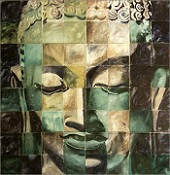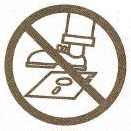Cumshot in the Dark posted:How are memories preserved in the storehouse consciousness then if nothing is transmitted? Mind is like a guy going to a Fedex with a box of stuff. "Ship it across the country to this other Fedex then immediately ship it back", he says. The employee takes his money, keeps the box in the backroom for a week, and waits for the guy to come back. The guy comes in a couple days later, picks up his box looking pleased, and none the wiser. Nothing goes anywhere, the problem is you think it does. That's karma. ThePriceJustWentUp fucked around with this message at 07:37 on Mar 20, 2014 |
|
|
|
|

|
| # ? May 16, 2024 04:15 |
|
Cumshot in the Dark posted:How are memories preserved in the storehouse consciousness then if nothing is transmitted? Part of SN 15.13 posted:For contex: So in some way we find ourselves living the lives of different people again and again, but there has to be some connection between each life, right? Just like if you see someone else being hungry while you are full, since the two of you are different people, you do not experience the hungriness of that other person, you are separate in that sense. If rebirth is like that then the teaching on ending rebirth is not relevant, because if the person you become after you die is separate in that sense, then there is no suffering coming from rebirth. The personal experience of suffering ends when you die, sweet, there's nothing to do here. Now think about what happens when you see an object which is painted red. You need a brain to visually see the object, you need a cultural context to say "that object is red". There is also however, the experience of the "redness" in itself. Where does the experience come from? Where is this experience preserved in the storehouse consciousness? When you die, where does the experience of things go? It just goes to wherever else there are conditions for experience. Like, in a previous life you really, really believed you were "John the carpenter" and in another life you really believed you were "Carmen the singer" or whatever, but in each of those lives there was an experience of pleasure or pain, not like the case where you are separate as two different people living now. The mind (according to my understanding so far) is that which experiences the redness of red, the heatiness of heat, the sorrowness of sorrow. For there to be joy, there has to be that which experiences the "color" of joy, these things cannot exist separately. (Because one just doesn't make sense without the other). This probably doesn't answer your question, but as you develop your meditation practice you'll get a more nuanced view of what it is that could be reborn (assuming rebirth as a working hypothesis). Rhymenoceros fucked around with this message at 12:05 on Mar 20, 2014 |
|
|
|
AlphaNiner posted:Well since my last post on page 8 I can't say I've delved much deeper into things but I have tried to take a more practical approach using some insights/snippets that have stuck in my mind; 
|
|
|
|
Cumshot in the Dark posted:How are memories preserved in the storehouse consciousness then if nothing is transmitted? Like a wake in water implies a boat, the realities of this life reflect the causes and conditions which arose in the last. Memories aren't preserved. Causes and conditions are preserved. Even in this mortal condition, memories are never preserved, only reconstructed. But memories are a thing of conscious mind, composite and fleeting. Alaya-vijnana is an accumulation of causes and conditions. It's not like memory in the sense your conceptual mind wants to make it.
|
|
|
|
I haven't practiced regularly in months, but I still get the urge to meditate. I follow through, sometimes. I've been feeling evasive lately -- evasive of responsibility, of emotion, of strong investment in anything. Disconnectedness and avoidance are obviously not the right way. What about honest passion without attachment? That's how I'd like to feel. I know the feeling, I've had it before. I desire for that feeling to be with me in general. I suppose I have attachment to that ideal, but I think that's fine. What would you say to someone who was feeling like me? Tentative is a way to describe it. I'm not engaging fully and mindfully with the universe right now -- like I'm at the edge of a pool dipping my toes in. Push me in. Engage me.
|
|
|
|
ashgromnies posted:I haven't practiced regularly in months, but I still get the urge to meditate. I follow through, sometimes. I've been feeling evasive lately -- evasive of responsibility, of emotion, of strong investment in anything. You're going to die. You have x number of breaths in your life, y number of heartbeats. A life in this world is a blink of time. Absurd, ain't it?
|
|
|
|
midnightclimax posted:Why would it be challenging, for a person with depression, to live as a monk? I don't mean to get personal, I'm just curious if there's some kind of optimum mental state you should be in, to qualify for a monk's life. I know someone else already answered this but thought I'd give my viewpoint as I have had depression. One of the problems of depression is the very volatile moods and sudden swings when things change rapidly, suddenly getting an assignment was enough to send me in a spiral down. The thought of giving up everything and living like a monk is hard for most people let alone a depressive who sometimes can't even function on a daily basis. Not only that but the onslaught of involuntary negativity is horrendous, your own thoughts are your worst enemy so the thought of meditating and being alone just you and your thoughts would be like a living nightmare (to me at the time at least).
|
|
|
ashgromnies posted:What would you say to someone who was feeling like me? Tentative is a way to describe it. I'm not engaging fully and mindfully with the universe right now -- like I'm at the edge of a pool dipping my toes in. Push me in. Engage me. Get into Eurorack and meditate on both the sound and the empty nature of your wallet.
|
|
|
|
ashgromnies posted:I haven't practiced regularly in months, but I still get the urge to meditate. I follow through, sometimes. I've been feeling evasive lately -- evasive of responsibility, of emotion, of strong investment in anything. What I'm about to say is one of countless possible ways to go about this, and there's also something that needs to be said first of all. The desire to live intensely or fully isn't intrinsically the desire for truth or freedom or enlightenment in the Buddhist sense. Or in any sense. It isn't therefore the only thing worth doing above all other things, and it's not necessarily the way to the ultimate dissolution as I call it, although it is if it is.. Passion doesn't necessarily mean the search for truth, it could more mean the desire to "spin up" your sense of identity, to explore "all the things you could do". That's the opposite way. No less important, but at the end of the day it is a sidetrack from "losing your mind". Maybe necessary even so. That all said, I personally would say the most important thing towards cultivating passion and what I will call the "consummation" of activities, where you lose yourself in what you are doing, getting in the zone, or living it, or knowing exactly what to do and how, all that, if you weren't born with the exact sense of what you should do and how, is anger. That was a super complicated sentence so I'll say it again. Anger is the most important thing. Anger is the deluded form of love. Don't worry about love. Assume you don't see clearly and act from that standpoint. Actual love is for those who see clearer and clearer. Trying to love is important but it's also so easy to mistake love for lust, desire, general tit-for-tat self interest, abstract "idiot compassion", the need to be liked, and so many other things. So don't worry about it! And by anger I don't mean rage, hatred, destructive lashing out, even aggressiveness for the sake of asserting oneself. I mean the kind of anger that comes with determination, and confidence in oneself. The fire. Do whatever you have to do to cultivate that. Go to a mountain and scream your head off. Do pushups every hour. Focus on your inner energies and just try to call it up. It's there. Don't whip yourself out of control and go kick cats and punch cars, just cultivate that raw feeling in you. Then you can direct it towards what you want. And then it will guide you and not the other way around. And then it will change form and become clearer, and clearer, and more precise, and less interested in "turning on itself" and more involved in only the world, and in transforming you into something you never would have thought possible without it. Anger turns to love. Trust me. That's also a Buddhist teaching though. Deluded emotions and their non-deluded counterparts. Anyway I hope this helped in some way. Good luck. You've got it in you if you want it.
|
|
|
|
|
ThePriceJustWentUp posted:What I'm about to say is one of countless possible ways to go about this, and there's also something that needs to be said first of all. The desire to live intensely or fully isn't intrinsically the desire for truth or freedom or enlightenment in the Buddhist sense. Or in any sense. It isn't therefore the only thing worth doing above all other things, and it's not necessarily the way to the ultimate dissolution as I call it, although it is if it is.. Passion doesn't necessarily mean the search for truth, it could more mean the desire to "spin up" your sense of identity, to explore "all the things you could do". That's the opposite way. No less important, but at the end of the day it is a sidetrack from "losing your mind". Maybe necessary even so. I don't even know what to do with this. The guy who sparked a gigantic argument over whether all emotions are suffering is now telling someone to deliberately cultivate an afflictive emotion and I just can't Edit: I'm really trying here but a lot of this is word salad and a lot of this is like, the opposite of Buddhism. Cultivating unfocused energy through an afflictive emotion is the opposite of mental discipline and moral discipline. Anger is an afflictive emotion - unlike other emotions, such as love, compassion, even sadness, anger is always a cause of suffering. I know you go on to try to redefine anger as not-anger, but that's not what that word means. You can't just go "yeah, cultivate anger. But not rage, hatred, fury, dissatisfaction, wroth, or anything like that. Just anger like feeling pumped up." I mean, what do you mean, anger is the deluded form of love? That doesn't make sense? Anger is an afflictive emotion, loving-kindness is the antidote to that poison. When you have anger, love is the antidote. It is not a homeopathy scenario here where the disease and the cure are different forms of the same thing - anger and love are not the same. Anger is anger, a poison, an afflictive emotion. Loving-kindness is a virtue, and loving-kindness is the antidote to anger. Paramemetic fucked around with this message at 03:36 on Mar 21, 2014 |
|
|
|
Ugrok posted:Hello ! Be like me and go Tibetan Buddhism (Gelugpa). You'll think you're reading the script for "Ghostbusters 3."
|
|
|
|
ashgromnies posted:I haven't practiced regularly in months, but I still get the urge to meditate. I follow through, sometimes. I've been feeling evasive lately -- evasive of responsibility, of emotion, of strong investment in anything. Cumshot in the Dark fucked around with this message at 03:36 on Mar 21, 2014 |
|
|
|
ashgromnies posted:I haven't practiced regularly in months, but I still get the urge to meditate. I follow through, sometimes. I've been feeling evasive lately -- evasive of responsibility, of emotion, of strong investment in anything. This happens to me quite often and it is a hard thing to snap out of. If you are still getting the urge to practice meditation I would recommend sticking with that, as it will eventually be an antidote to these feelings. I would also recommend practicing metta meditation if you aren't currently - and start earnestly with yourself in terms of loving kindness. I know this is easier said than done - I am in the midst of almost the exact same situation right now. This phase, like all things, will pass away. edit: There is a concept the Buddha talked about called "spiritual urgency" (samvega in Pali). Basically, it kind of relates to what Mr Mambold said: Mr. Mambold posted:You're going to die. You have x number of breaths in your life, y number of heartbeats. A life in this world is a blink of time. Absurd, ain't it? The Pabbatopama Sutta is relevant to this. People Stew fucked around with this message at 04:15 on Mar 21, 2014 |
|
|
|
Paramemetic posted:Like a wake in water implies a boat, the realities of this life reflect the causes and conditions which arose in the last. Man, that wake in the water statement. Did you just make that yourself? That's a hell of a thing there.
|
|
|
|
Thanks for the clarifications re: secular buddhism & other things. Interesting stuff.
|
|
|
|
ashgromnies posted:I haven't practiced regularly in months, but I still get the urge to meditate. I follow through, sometimes. I've been feeling evasive lately -- evasive of responsibility, of emotion, of strong investment in anything. Non-attachment should be renamed "keeping an open heart". It's when you're not attached you can love someone freely no matter who they are or what they do. It's when you love someone freely no matter who they are or what they do that you're not attached to them. If you feel disconnected, give yourself some kindness, give yourself some compassion. This leads to happiness, it just does, every time. You can always have some compassion for yourself and whatever situation you're in, every time.
|
|
|
|
Hey everybody, just letting you know that Coursera has got Princeton's "Buddhism and Modern Psychology" up as a free course that started just this week. I've only just started the course and am only a beginner almost-Buddhist, so I'm not making any claims that he's going to be dogmatically correct all that time, but the intersection between Buddhism and modern psychology is what brought me to to Buddhism. I believe you can still sign up and get access to the lectures and all that fun stuff. Some of the students in the chatroom are zen practitioners and other fairly established Buddhists, so it promises to be an interesting course.
|
|
|
|
Yeah, I subscribed to that course as well. Listened to the first session, really looking forward to the second one. Also his "Recommended Readings and Other Resources" for each session make for a nice intro to buddhism. (e.g. like this lecture on "The Four Noble Truths" by Bhikkhu Bodhi http://www.buddhanet.net/audio-lectures.htm )
|
|
|
|
I meant more getting fed up than I meant getting angry up above. Getting mad. About your own condition, circumstances, mental state, all of the internal stuff. Not getting mad at the outside world and lashing out, although that might be sometimes an unfortunate side effect. Don't get mad, get even as they say. Do something about it, with the kind of back-to-the-wall determination that it must be done. That's where passion comes from if it comes out of nowhere. Some people are born with the mind and the ability to do what they love and I'm not talking about them. I'm talking about if you think you have something in you but don't know what it is. If you don't think you have anything in you, generally speaking, don't worry about it and just live life until things come together more. You don't ever have to do anything. The only pressure in life is that which you put on yourself and that which culture puts on you. There is no cosmic pressure and don't let anyone tell you otherwise. Just trying to clarify a bit. This is something I think people should be thinking about. Past just being nice to yourself and others. From what basis, and to what end should you be kind/generous/compassionate to yourself and others? Those are the real questions. ThePriceJustWentUp fucked around with this message at 04:47 on Mar 22, 2014 |
|
|
|
|
midnightclimax posted:Yeah, I subscribed to that course as well. Listened to the first session, really looking forward to the second one. Also his "Recommended Readings and Other Resources" for each session make for a nice intro to buddhism. (e.g. like this lecture on "The Four Noble Truths" by Bhikkhu Bodhi http://www.buddhanet.net/audio-lectures.htm ) While we're on the topic of lectures and such, I figure it is a good time to plug Bhikkhu Bodhi's Systematic study of the Majjhima Nikaya. If anyone is interested in going through the suttas of the Middle-Length discourses with one of the most well-respected Pali translators as a guide, there are something like 2 years worth of lectures there. It also gives a good path for working your way through the Majjhima Nikaya, since he arranges the Suttas by themes. Many of them have pdf copies of the handouts he uses during lectures.
|
|
|
|
Prickly Pete posted:While we're on the topic of lectures and such, I figure it is a good time to plug Bhikkhu Bodhi's Systematic study of the Majjhima Nikaya. Good stuff - thanks for the link.
|
|
|
|
Prickly Pete posted:While we're on the topic of lectures and such, I figure it is a good time to plug Bhikkhu Bodhi's Systematic study of the Majjhima Nikaya. If anyone is interested in going through the suttas of the Middle-Length discourses with one of the most well-respected Pali translators as a guide, there are something like 2 years worth of lectures there. Wow, thanks. I'm going to start working through this.
|
|
|
|
I have really enjoyed the talks by Ajahn Brahm. In this one he talks about how life gets easier when you don't own things in the abstract sense like "I got a promotion because of what kind of person I am". That's because if you go owning the promotion in that way you have no choice but to own being fired as well if you get fired. I would like to take some distance from the kind of thinking that things happen because of me and because of how I'm like. But I wonder how to stop that kind of owning. If something good happens, should I just remind myself "it's not because of my personality"? Somehow that feels it wouldn't work. Would it be better to search for a cause elsewhere than to emphasize to myself that the cause wasn't me? For example, if my habitual thought response was "it was because of how awesome I am this nice thing happened" (or "it's because I'm so terrible that this bad thing happened"), would it be better to think "how lucky that this happened to me, sometimes you encounter nice things in this world" (or "how unlucky, sometimes you encounter bad things") instead of just denying that the cause was me? Because while taking everything personally is bad removing yourself from everything and becoming detached would be no better either, and focusing on how something has NOT to do with me might lead to that. Focusing on outside causes feels it might be a good approach. I got to say I really like Ajahn Brahm's talks.  In the one I linked he tells the importance of keeping in mind that we are good enough as we are and what we do is good enough as well. That thought is really liberating. In the one I linked he tells the importance of keeping in mind that we are good enough as we are and what we do is good enough as well. That thought is really liberating.
|
|
|
|
Perhaps try not attributing ownership of situations at all? Rather than replacing "this happened because I'm such a good employee" or whatever, leave it at "this happened." Then you can more fully appreciate it as well. Be happy when the situation warrants, such as the promotion, but that happiness should come from the actual situation, rather than from claiming ownership of the situation.
|
|
|
|
That sounds good, but I feel I'm doing it wrong when I try to think that way but still see it through the perspective of "this happened because of how I am". But I realize that self-centered thinking has had a lot of reinforcement. I'll just have to be patient.
|
|
|
|
Paramemetic posted:Perhaps try not attributing ownership of situations at all? Rather than replacing "this happened because I'm such a good employee" or whatever, leave it at "this happened." Then you can more fully appreciate it as well. Be happy when the situation warrants, such as the promotion, but that happiness should come from the actual situation, rather than from claiming ownership of the situation. Shouldn't one take ownership of the situation, good or bad, but not either bask too much in the benefits nor wallow too much in the negatives of it? As far as where we are in our lives currently, all of that is in relation (to some degree) to choices that we have made in this and previous lifetimes. I think we should own situations that we are responsible for but recognize that everything from that moment on (as has always been) is transitory. Once the event has occurred, it's occurred. Good or bad, life moves along.
|
|
|
|
Count Freebasie posted:Shouldn't one take ownership of the situation, good or bad, but not either bask too much in the benefits nor wallow too much in the negatives of it? As far as where we are in our lives currently, all of that is in relation (to some degree) to choices that we have made in this and previous lifetimes. I think we should own situations that we are responsible for but recognize that everything from that moment on (as has always been) is transitory. Once the event has occurred, it's occurred. Good or bad, life moves along. Acknowledging the reasons of the thing is different from taking ownership of it, I think, but I think this is a problem of language. To me, acknowledging the reason for a thing happening, the cause and effect that took place, is not the same as taking "ownership" of it in the sense of "this is happening because of me, because I'm a good person who does good things." Of course, if I have a patient who calls my company and says "that dude was really good, you should reward him" then an honest assessment of the situation must acknowledge I'm getting praise because of good work I have done. The error comes when we "take ownership" of that, when we go "because I'm so good, I get rewards. This reward proves I am a good worker." and so on. That thinking serves to reinforce the ego, and the delusion that we're separate, and the concept that we have things that are intrinsically us. Certainly, all of it is because of cause and effect. We get rewards when we do well. We get punishments when we do poorly. Even if we don't get punishments, we reap the results of our karma. The error comes when we start to associate that good with ourselves. "Taking ownership" requires an owner, and reinforcing that there is an owner is troublesome. So, that's what I mean by simply allowing it to happen. A good way to think of these things is "I'm getting a reward, okay. I must have done something that makes other people happy. I should continue to do that thing," rather than, "I'm getting a reward. I really deserve this one, because I am good at my job. I am clearly very competent and good." The former acknowledges cause and effect without taking ownership, without asserting that something is a result of one's own intrinsic properties. The latter mistakenly asserts that a thing is happening because of intrinsic qualities of Me, rather than simply because of cause and effect.
|
|
|
|
Rurik posted:I have really enjoyed the talks by Ajahn Brahm. In this one he talks about how life gets easier when you don't own things in the abstract sense like "I got a promotion because of what kind of person I am". That's because if you go owning the promotion in that way you have no choice but to own being fired as well if you get fired. A more skillful way is trying to relate differently to the ups and downs of life. For example, when something happens in your life, you can think of those situations like guests coming to your house. Sometimes the guest is a good friend, sometimes the guest is an annoying relative, sometime it's the tax auditor or even someone you really dislike. None of those guests can stay for ever, they always have to leave at some point. What can you do about it? Well you can be kind to them, and try your best to enjoy their company. Then the good friends stay longer, and the other's won't seem so bad. How you perceive things decide how you respond to them. To perceive an object differently, you have to change your perception by noticing (paying attention to) other aspects of that object. Next time you have happiness, just notice when it disappears and something else comes. Next time you have suffering, just notice when it disappears and something else comes. When you notice that things come and go whether you like it or not, then you can know that it's not because of who you are, but it's just how life is. Don't argue with yourself, but pay close attention to, be mindful of, life and dare to be completely honest about what you see, and also keep listening to Ajahn Brahm  Just to give an example: In a threatening situation, fight or flight behavior follows. To change your behavior in a threating situation is pretty much impossible, but it is easy to learn how to perceive the situation differently. Like, if someone yells at you, you feel attacked, and then maybe you yell back "yeah well gently caress you too, buddy"; the situation here has been perceived as warranting defense and counter attack. If you reflect upon when you yourself have yelled at others, you might recall that this happens when you had a very bad day, or you might notice as you are yelling at someone, that it is because you feel really frustrated. Now you can perceive being yelled at differently: now when someone yells at you, you don't perceive "this person is attacking me" you perceive "this person is yelling at me because he is frustrated and has had a bad day." And you don't yell back "yeah well gently caress you too, buddy", because in your interpretation of the situation, defense is not warranted. Maybe you have some compassion for the poor fellow instead? I just really want to make the point that it's important to find skillful ways to change how you see things, please don't just criticize yourself and think that somehow that will change anything.
|
|
|
|
I would go one step farther and eliminate the idea of "good" and "bad" altogether. I would say that while yeah, removing ownership is one way of going about it, another way is to just go "Ok I got promoted." "Ok I got fired." Treat both with equanimity. For all you know, you getting promoted leads to more stress, more responsibilities, and working under someone who will give you a tough time, whereas getting fired leads to you finding your dream job and being free of stress. At the end of the day we have no idea whether what we like or want to happen to us is actually something that is contributing to our life positively. Rather than worrying about good or bad, just accept everything that comes at you. By fighting the situations of your life, you are fueling passion (wanting to hold onto your good situation) and aggression (wanting your situation to change) and eliminating the possibility of the cessation of suffering. There's a good story that Pema Chodron shares in "When Things Fall Apart" that I feel speaks to this situation well: quote:I read somewhere about a family who had only one son. They were very poor. This son was extremely precious to them, and the only thing that mattered to his family was that he bring them some financial support and prestige. Then he was thrown from a horse and crippled. It seemed like the end of their lives. Two weeks after that, the army came into the village and took away all the healthy, strong men to fight in the war, and this young man was allowed to stay behind and take care of his family.
|
|
|
|
Totally seconding this. I would add that we don't control much in our lives, really. The only thing we can really do is act here and now. So trying to manipulate our reactions, trying to get rid of them, or considering that they are not "skillfull" or, on the contrary, very "skillfull", is just adding to your suffering. If you are happy, then great. If not, then not. Time to act to change this. But discussing with yourself about your reactions won't lead you to happiness. Reactions happen ; they are what they are. Just let go and do the next cool thing you have to do. If you can't let go, then don't let go, and do the next cool thing you have to do.
|
|
|
|
Brad Warner posted an interesting article on his blog recently that ties in with the whole "attainment" culture surround meditation and enlightenment (which I describe often as the "Daniel Ingram bullshit"). bradwarner posted:This is why the Heart Sutra says that there is nothing to attain. Itís not a joke. Itís not a metaphor. There is nothing to attain. Good stuff. http://hardcorezen.info/attaining-enlightenment/2605
|
|
|
|
Supposedly Rinzai was fond of saying that he couldn't find even one single un-enlightened person. Dogen was fond of saying that Rinzai was correct in that, but that one also can't find even one enlightened person.
|
|
|
|
The-Mole posted:Supposedly Rinzai was fond of saying that he couldn't find even one single un-enlightened person. Dogen was fond of saying that Rinzai was correct in that, but that one also can't find even one enlightened person. Dogen was great.
|
|
|
|
Has anyone read much of Brad's stuff? Hardcore Zen is great and I like a lot of what he writes on his blog. I feel that he is one of the strongest advocates for modern Buddhism in the West. He has a good sense of humor, and a good sense of what's important. I also enjoyed the book "Confession of a Buddhist Atheist"... as a westerner born to an irreligious family, I have an ingrained cynicism regarding supernaturalism and magic, but have found refuge in Buddhist ways of practicing, thinking and existing. It's nice to hear perspectives from others who have a similar background and have dealt with similar insecurities -- concerns of cultural appropriation(ever have other westerners roll their eyes when you mention Buddhism? I blame the mushy-minded granola freaks for creating that perception), improper practice, etc. Many Western Buddhist converts have different perspectives and beliefs than those who were raised Buddhist in primarily Buddhist societies. Sometimes it feels like the more secular western practitioners are thought to be cultural appropriators, orientalist fetishists, or empty-minded malcontents looking for a way to rebel. It's nice when people provide cogent counterexamples to defeat those misconceptions.
|
|
|
|
he1ixx posted:Brad Warner posted an interesting article on his blog recently that ties in with the whole "attainment" culture surround meditation and enlightenment (which I describe often as the "Daniel Ingram bullshit"). I think obsessing over attainments is obviously contrary to the point of reaching them, of course. But I also disagree that they serve no purpose. The Buddha said a great deal about attaining jhana, and striving toward that shouldn't be dismissed outright. I have seen this kind of reasoning before: People are obsessing over attainments, so we should instead do a complete 180 and encourage people to give them no weight or consideration whatsoever. Maybe it is a Zen thing.
|
|
|
|
It comes partly out of the Buddha emphasizing that people are absolutely terrible at accurately ascertaining what ~meditative attainments~ would even look like. Further, the criticism tends to come about people thinking of them as something that a person "has" or "gets," which implies that they are materially real. Zen does emphasize not getting caught up in such things, though I've noticed that in every other branch of Buddhism I've run across, as well. I know Zen specifically treats such things as more of the starting point of practice rather than the end goal. More of a "you had a meditative experience? Great! That's a great jumping off point!" rather than a "You had a meditative experience? Time to start a sanga, you're obviously enlightened, perfect, and never need to do anything again."
|
|
|
|
The-Mole posted:It comes partly out of the Buddha emphasizing that people are absolutely terrible at accurately ascertaining what ~meditative attainments~ would even look like. Further, the criticism tends to come about people thinking of them as something that a person "has" or "gets," which implies that they are materially real. There is certainly a tendency to get caught up in the what and how of attainments, rather than the "why". Along with this is a tendency to use them as some sort of ranking or scoring of teachers against each other, etc. The pleasant factors that are associated with each jhana are different than the more coarse, material sensations that are often the source of clinging, but they can still lead to attachment for sure. Even the idea of jhana can lead to clinging, I'm sure.
|
|
|
|
I came across a line last week from Trungpa that really put these kinds of things into perspective for me. Perhaps it'll give you guys something to chew on as well:quote:Interestingly, although the bodhisattva has taken a vow not to attain enlightenment, because he is so precise and accurate, he never wastes one second. He always lives life thoroughly and fully, and the result is that, before he realizes where he is, he has attained enlightenment. But his unwillingness to attain enlightenment continues, strangely enough, even after he has reached buddhahood. Then compassion and wisdom really burst out, reinforcing his energy and conviction. If we never tire of situations, our energy is joyous. If we are completely open, fully awake to life, there is never a dull moment. In a way, focusing on attainments takes you away from the present, from working with your current situation, from striving to help others, and whether or not there are attainments isn't really something you should concern yourself with. At least, that's how I interpret it. Just keep meditating and chugging along, and be less focused on where you're going and more focused on how you're going, if that makes any sense
|
|
|
|
ashgromnies posted:Has anyone read much of Brad's stuff? Hardcore Zen is great and I like a lot of what he writes on his blog. I feel that he is one of the strongest advocates for modern Buddhism in the West. He has a good sense of humor, and a good sense of what's important. I've read all of Brad's books (except for his last one about the idea of God). I like his writing a lot. He's moving to Philly so maybe I'll get a chance to say hi. He's an interesting guy with some interesting views on all of this. I also read "Confessions..." by Batchelor early on in my study of Buddhism when many of the concepts like rebirth and karma chafed my angry-at-christianity-dogma "self" (I've relaxed on that stuff obviously) I think the idea of collecting attainments like they were something that goes on a shelf is pretty wacky and viewing the whole thing as a competitive focus almost is pretty much the opposite of what I understand Buddhism to be about. I think that's the important part of having a real life teacher you can talk to about this stuff. You come to them and you're "hey I had this thing where I dissolved and blah blah" and the teacher says, "That's nice. So anyway..." so you don't get carried away trying to chase that experience again and again or get a big head because you did something that the Buddha supposedly wrote about in the Pali canon. It's a very good way to stay centered. I think Brad actually mentioned (as have others) that the day after you have an experience while meditating, you still get up in the morning and have to live in the world. It changes things but then again, it really doesn't.
|
|
|
|

|
| # ? May 16, 2024 04:15 |
|
So this is idea of non-duality in (Zen) Buddhism. Is it basically some kind of radical constructivism, or am I missing something? I did a bit of googling and wiki-reading, but to me that's all I currently see in it.
|
|
|





















